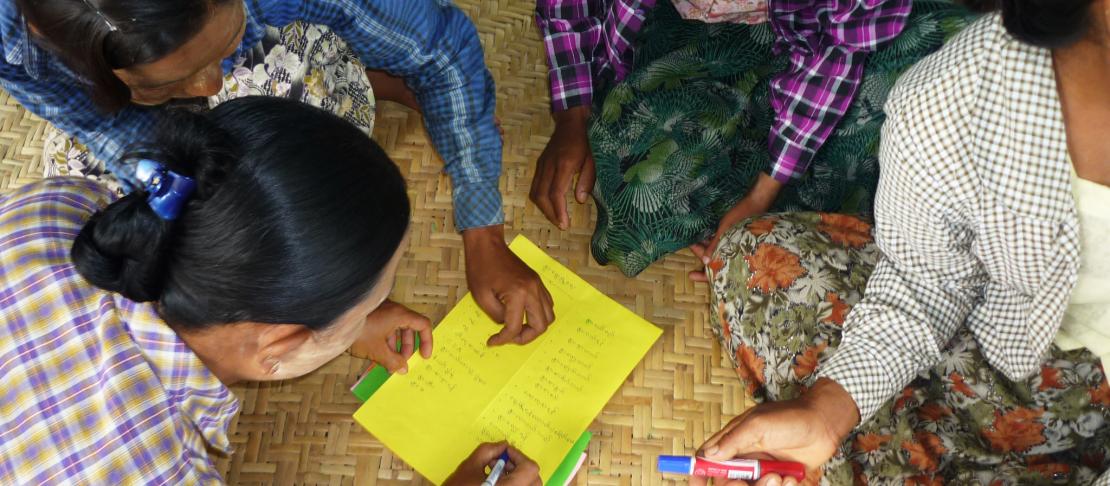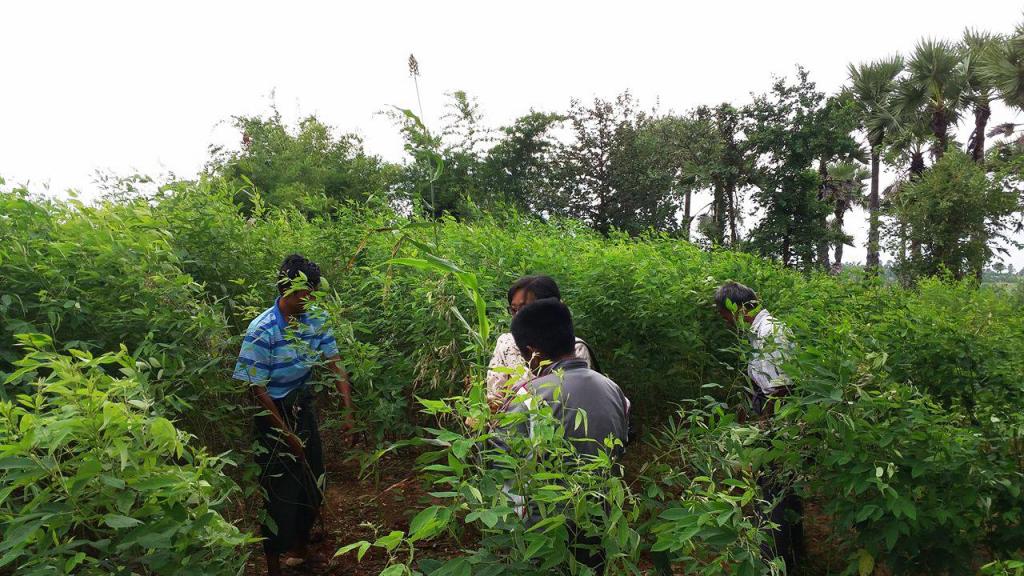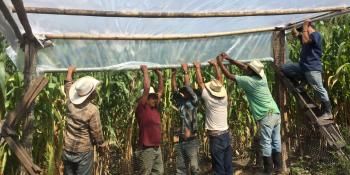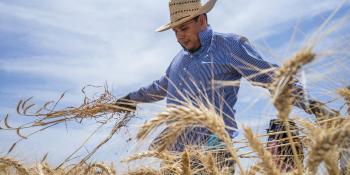Climate-Smart and Nutrition-Smart Villages: the key to a food-secure Myanmar

The scaling out of climate-smart agriculture technologies and practices using community based adaptation strategies is a potential solution to food security and nutrition challenges.
Food insecurity remains a problem in Myanmar, with 25% of households living below the official poverty line. As an agricultural country with a large percentage of smallholder farmers, Myanmar’s food security, nutrition, and livelihoods have been greatly affected by the increasing incidence of drought, flooding due to heavy rains, stronger cyclones, and salinization of farms. Climate-smart agriculture (CSA) can be designed to reduce inequities and empower the poor, especially women.
Because the impacts of climate change differ significantly from one agro-ecosystem to another, adaptation measures should ideally be tailor-made, targeted, location-specific, and community-based. Community based adaptation (CBA), first tested in the Philippines by the International Institute of Rural Reconstruction (IIRR) with support from the CGIAR Research Program on Climate Change, Agriculture and Food Security in Southeast Asia (CCAFS SEA), is a process-oriented approach which features technological, social, and institutional elements.
Complementing the CSA initiatives in the Philippines, a school nutrition project funded by the International Development Research Centre (IDRC) that aims to mainstream climate-smart and nutrition-sensitive activities was implemented in schools. By promoting climate- and nutrition-smart agriculture practices, schools have become platforms for both nutrition and climate-smart agriculture. This IDRC-supported model building action research and capacity building initiative in the Philippines also helped establish evidence for national policy makers.
With funding from IDRC and in partnership with CCAFS SEA, IIRR is now bringing the Climate-Smart Village (CSV) concept to Myanmar. The project aims to fine-tune, refine, adapt and optimize the CSV approach as a platform for supporting CBA processes in four different agro-ecological and socio-cultural settings within Myanmar; develop and test scalable social learning processes and institutional mechanisms which facilitate or drive CBA processes resulting in multiple/co-benefits for farm households; and scale up the most successful social, technological and methodological innovations through sub-national governments/institutions, civil society organisations, and research and teaching institutions. IIRR's work in Myanmar will feature linkages with local research stations and local NGOs.
Creating an enabling environment
In 2015, Myanmar published its Climate-Smart Agriculture (CSA) Strategy, which provides a framework for transitioning the agricultural sector in the context of climate change impacts and socio-economic challenges. The strategy envisions the development of technical, political, and economic conditions to achieve sustainable agricultural development for food security and nutrition through climate-resilient and sustainable agriculture.
To help in the implementation of support programs under the Myanmar CSA Strategy, IIRR, with support from CCAFS SEA, conducted a scoping study in 2016, covering four separate cultural and ecological locations. Using Participatory Rural Appraisal approaches and tools such as key informant interview and focus-group discussions, the study assessed the technological, social, and institutional landscapes in the four agro-ecological zones.
 Pigeon pea crop performance check conducted by Nyaung U Research Station team at Htee Hpu village. Photo: IIRR
Pigeon pea crop performance check conducted by Nyaung U Research Station team at Htee Hpu village. Photo: IIRR
Building Myanmar’s Climate-Smart and Nutrition-Smart Villages
Based on the results of the scoping study, four potential areas representing different agro-ecological zones were identified for establishing CSVs. The proposed areas for CSVs in Myanmar are HtiPhu Village in Mandalay Region (dryland, sandy, semi-arid land), MakyaukAia Village in Chin State (highland), KyautNgat Village in Shan State (upland) and Ma Sein Village in Ayeyarwaddy Region (lowland delta). These four CSVs will serve as model villages for the other villages in the township.
Using social learning methods and participatory approaches to generate knowledge on upscaling approaches, the CSVs will serve as learning platforms for scaling-out CSA and CBA at the township level. The CSVs are envisioned to reach out to at least 5 more villages in each agro-ecological zone, projecting a total reach of 24 villages that benefit directly from the research and capacity building activities.
The program is also being built on a rich tradition of climate-resilience practices already being used by smallholder farmers in Myanmar. The selected villages already have some impressive climate-smart and nutrition-friendly agricultural practices, such as an emphasis on legumes, recycling of organic matter, intercropping and crop rotation, and the inclusion of small livestock. The CSV approach in Myanmar will be somewhat unique because in addition to farms it will include homesteads, schools and community forests surrounding the CSVs. Since livestock are important assets for the poor, fodder banks and livestock feed will also be given attention.
Through this project, a portfolio of CSA technologies and practices that deliver multiple benefits, such as reducing emissions and improving adaptation while securing livelihoods and food and nutrition, will be produced. Towards the end of the project, IIRR, with IDRC and CCAFS SEA and its local research and NGO partners, will promote and share their findings with the wider community via knowledge products, dialogues, and field outreach events in the different CSVs.
__________________________________________________________________________________
About IIRR's work on climate-smart agriculture:
The work of the International Institute of Rural Reconstruction (IIRR) in Myanmar is part of its commitment to demonstrate and promote participatory and people-driven approaches to rural development. IIRR is a community development and hands-on training and research organization with 60 years of experience. IIRR is a strategic partner of CCAFS, and is helping to develop approaches to scaling up climate-smart agriculture at local government level in the Philippines, particularly in demonstrating a CSV model in the municipality of Guinyangan in Quezon province. This work has been picked up the Department of Agriculture of the Philippine national government, which has invited IIRR to support the implementation of similar activities in the government’s Adaptation and Mitigation in Agriculture (AMIA) program. With these experiences and track record, IIRR hopes to replicate a CSV in Myanmar in the next three years with CCAFS.
Read more:
- CCAFS blog: Unlocking Myanmar’s potential for establishing Climate-Smart Villages
- CCAFS blog: Myanmar’s climate-smart agriculture strategy: a roadmap to resilience and sustainability
- CCAFS blog: Myanmar pushes for adaptation in agriculture during climate negotiations
Eisen Bernardo is the Senior Communication Specialist of CCAFS Southeast Asia.



